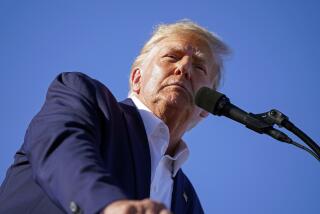L.A. Chileans Hail Ruling on Pinochet
Los Angeles Chileans who suffered abuses under military rule cheered the British court ruling Wednesday that former dictator Augusto Pinochet is not immune from prosecution for human rights atrocities, but were disappointed by the limitations it imposed on the bid to extradite him to Spain.
Britain’s seven-member panel of Law Lords ruled that Pinochet’s former head-of-state status did not grant him immunity for human rights abuses during his 1973-1990 military rule, but said he could only be held responsible in England for crimes committed after 1988, when Britain adopted the International Convention Against Torture.
The decision means that the 83-year-old general is not free to leave England. But it effectively throws out most of the charges brought against him in Spain for dozens of Spaniards who were among the 3,000 people who died or disappeared in the aftermath of the bloody 1973 military coup in Chile.
Southern California torture rehabilitation expert Jose Quiroga, who was at the National Palace when soldiers bombed it in September 1973 and witnessed the suicide of Chile’s elected president, Salvador Allende, had mixed feelings about the British ruling.
“They seem to have established a statute of limitations that you generally don’t have for crimes against humanity,” he said. “But the verdict does establish that there is no immunity from prosecution under international law for a president or any people who commit these crimes--and means he will face a long trial for extradition.”
Juan Rojas, one of the local Chileans who met with lawyers in Los Angeles after Pinochet’s arrest to draw up affidavits describing torture, imprisonment and exile after the coup, said he still has hopes of testifying against Pinochet.
“The most serious crimes occurred before 1988, but if he is extradited to Spain, they will make their own determinations about what he can be tried for,” Rojas said.
Westside artist Francisco Letelier, who has called for the United States to prosecute Pinochet for the 1976 Washington car-bombing that killed his father, Orlando Letelier, said it was a shame Pinochet could not be extradited for coup-era human rights issues.
“But this means he’ll be detained in London quite a bit longer, and he’s still not out of the woods yet,” Letelier said.
And while Pinochet has guaranteed immunity in Chile, the international uproar after his Oct. 16 arrest in London has emboldened would-be challengers, Letelier said.
Many local Chileans agreed with Rep. George Miller (D-Martinez), leader of efforts to win U.S. cooperation in the Spanish case against Pinochet, who characterized the ruling as a chilling message to rights abusers worldwide.
“The sign on the door of the international community now reads ‘Murderous Dictators Not Welcome. Travel at Your Own Risk,’ ” Miller said.
More to Read
Sign up for Essential California
The most important California stories and recommendations in your inbox every morning.
You may occasionally receive promotional content from the Los Angeles Times.










